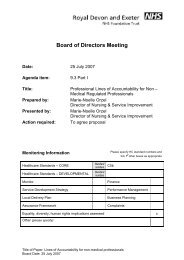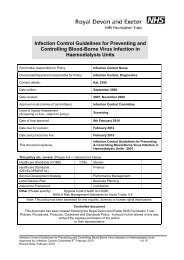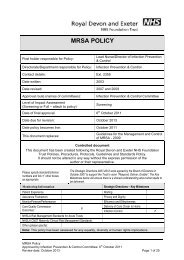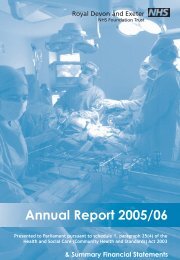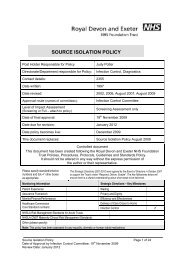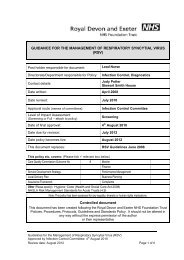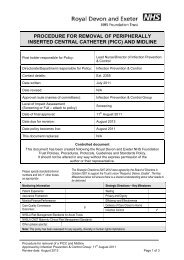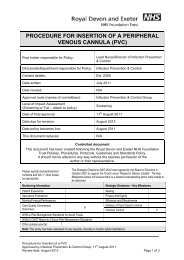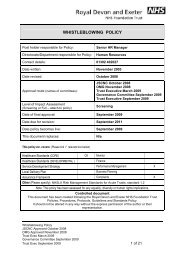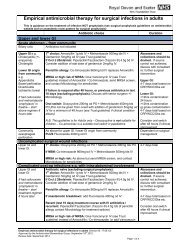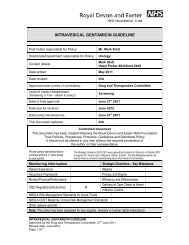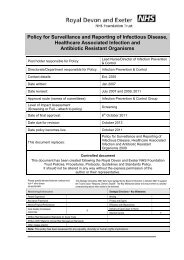Annual Report and Accounts 2012/13 - Royal Devon & Exeter Hospital
Annual Report and Accounts 2012/13 - Royal Devon & Exeter Hospital
Annual Report and Accounts 2012/13 - Royal Devon & Exeter Hospital
Create successful ePaper yourself
Turn your PDF publications into a flip-book with our unique Google optimized e-Paper software.
122 5. Our Governors <strong>and</strong> Members<br />
<strong>Royal</strong> <strong>Devon</strong> <strong>and</strong> <strong>Exeter</strong> NHS Foundation Trust<br />
<strong>Annual</strong> <strong>Report</strong> <strong>and</strong> <strong>Accounts</strong> <strong>2012</strong>/<strong>13</strong><br />
• Representative of the ethnic<br />
diversity within the wider public<br />
• Older than the general public<br />
served by the Trust<br />
• Marginally more likely to be<br />
female than male.<br />
For research purposes, engaging<br />
with members about their priorities,<br />
concerns <strong>and</strong> ideas for healthcare<br />
provides a 'good enough' correlation<br />
with the broader community. This<br />
means that in our engagement with<br />
members, we can be confident that<br />
the views we hear can be said to be<br />
sufficiently overlapping with what<br />
members of the public generally would<br />
say. This provides a useful rationale for<br />
membership for Foundation Trusts.<br />
Having a membership base allows a<br />
meaningful relationship to be developed<br />
between members <strong>and</strong> the Trust.<br />
Developing this engagement helps<br />
us to deepen our underst<strong>and</strong>ing of<br />
their views <strong>and</strong> opinions which we<br />
can correlate to the views of the wider<br />
community. Developing an ongoing<br />
dialogue with members provides an<br />
opportunity for the Trust to develop its<br />
thinking, test ideas, <strong>and</strong> give members<br />
an overview of potential future<br />
strategic options, which it can then<br />
engage with members on in a way<br />
that genuinely allows for influence <strong>and</strong><br />
boundary setting (e.g. options which<br />
members would find unpalatable). This<br />
proactive <strong>and</strong> timely way of engaging<br />
with members is far preferable as a<br />
way of enabling genuine stakeholder<br />
engagement <strong>and</strong> influence than<br />
the more orthodox approach taken<br />
elsewhere in public service. Under this<br />
type of model, changes are made or<br />
formulated by a public body <strong>and</strong> then<br />
views taken through consultation –<br />
sometimes post-hoc. That is not to<br />
say the methodology deployed by the<br />
RD&E is perfect <strong>and</strong> it is important to<br />
ensure that we guard against asking<br />
the same set of people all the time,<br />
<strong>and</strong> also to occasionally test whether<br />
the views of members do correspond<br />
to the views of the public more<br />
generally.<br />
The ongoing conversation with our<br />
members – expressed primarily through<br />
our Members Say events – is a very<br />
important aspect of the Trust’s work<br />
that provides genuine added value in<br />
informing its work – whether that is<br />
in a relatively minor operational detail,<br />
potential service change, ways to<br />
improve services in the best interests of<br />
patients/public, or on bigger <strong>and</strong> more<br />
strategic issues.<br />
This makes it even more important,<br />
therefore, that we have a membership<br />
base that corresponds ever more<br />
closely with the demographics of the<br />
broader population served by the<br />
Trust. The analysis undertaken of our<br />
membership base shows that the Trust<br />
needs to do more to encourage:<br />
• Members from lower<br />
socio-economic groups/more<br />
urban settings<br />
• Members who are younger than<br />
the current membership profile<br />
• More men to become members.<br />
These shortcomings in the<br />
representativeness of our membership<br />
base do require work. However, they<br />
are insufficiently significant to skew the<br />
research undertaken with Members,<br />
which we consider to be sufficiently<br />
representative of the wider community.<br />
The above points provide some priority<br />
areas for more targeted recruitment by<br />
the Member <strong>and</strong> Public Engagement<br />
working group.



